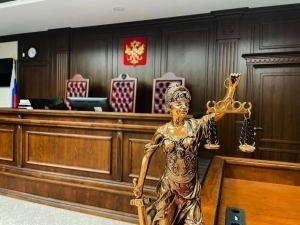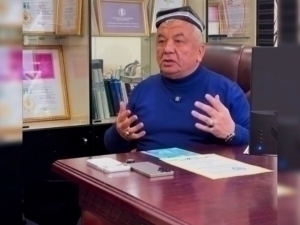“Baxti Tashkentskiy” case: verdict is announced
Crime
−
19 July 2024 26156 5 minutes
Today, July 19, the verdict was announced in the open court session for the criminal case involving Baxtiyor Qudratullayev, known as "Baxti Tashkentskiy," and others. The Supreme Court's press service reported this.
This criminal case was heard by the Chairman of the Shaykhontokhur District Court for criminal cases, Tolibjon Obidov, in the first instance.
According to the court verdict:
- B. Qudratullayev (born in 1971 in Tashkent, previously convicted) was found guilty of crimes under several articles of the Criminal Code and sentenced to 20 years in prison. He was classified as a highly dangerous recidivist and will serve his sentence in a high-security colony. Additionally, he will undergo mandatory drug rehabilitation during his sentence.
- Sh. Qurbonov (born in 1964 in Tashkent region, previously convicted) was sentenced to 8 years and 2 months in a general-regime colony for committing crimes under several articles of the Criminal Code.
- B. Zafarov (born in 1994 in Tashkent, previously convicted) was sentenced to 11 years in a general-regime colony.
- Sh. Rahimov (born in 1981 in Samarkand region, previously convicted) was sentenced to 17 years in a general-regime colony, with mandatory drug rehabilitation during his sentence.
- A. Xo'jayev (born in 1982 in Tashkent, previously convicted) was sentenced to 7 years, 3 months, and 20 days in a strict-regime colony.
- D. Sharipov (born in 1980 in Namangan region, previously convicted) was sentenced to 14 years, 10 months, and 14 days in a high-security colony as a highly dangerous recidivist.
- A. Mirzaxanov (born in 1972 in Tashkent) was sentenced to 13 years in a general-regime colony.
- Sh. Sulaymonqulov (born in 1978 in the Surkhandarya region) and A. Norkulov (born in 1997 in Tashkent) were each sentenced to 3 years in a location colony.
- S. Xatamov (born in 1991 in Fergana region) was sentenced to 2 years in a general-regime colony and additionally deprived of the right to work in material and managerial positions for 5 years and 6 months.
- N. Jumaniyazova (born in 1983 in Tashkent) was sentenced to 4 years, 4 months, and 24 days of restricted freedom.
- R. Shakurov (born in 1971 in Tashkent, previously convicted) was sentenced to 6 years, 8 months, and 14 days in a general-regime colony, with mandatory drug rehabilitation during his sentence.
- Sh. Qudratullayev (born in 1966 in Tashkent, previously convicted) was sentenced to 10 years and 6 months in a high-security colony as a highly dangerous recidivist.
- T. Turmonov (born in 1966 in Tashkent region) was sentenced to 10 years in a general-regime colony.
- F. Vapayev (born in 1988 in Khorezm region, previously convicted) was sentenced to 8 years, 10 months, and 18 days in a strict-regime colony.
- M. Nasirxodjayev (born in 1979 in Tashkent, previously convicted) was sentenced to 12 years in a high-security colony as a highly dangerous recidivist.
- D. Mo’minxo’jayev (born in 1991 in Tashkent region, previously convicted) and M. Usmonboyev (born in 1995 in Tashkent, previously convicted) were each sentenced to 9 years and 6 months in a general-regime colony.
- M. Shodmanov (born in 1969 in the Kashkadarya region, previously convicted) was sentenced to 10 years and 6 months in a strict-regime colony.
- B. Xudoyorov (born in 1984 in the Kashkadarya region, previously convicted) was sentenced to 10 years in a high-security colony as a highly dangerous recidivist.
- A. Mashrafxonov (born in 1970 in Tashkent) and V. Qurbanov (born in 1973 in Tashkent) were each sentenced to 4 years and 6 months in a general-regime colony.
- A. Maxamadiyorov (born in 1982 in Tashkent, previously convicted) was sentenced to 3 years, 6 months, and 21 days in a general-regime colony.
- A. Jo'rayev (born in 1989 in Tashkent) was sentenced to 5 years in a general-regime colony.
- B. Bakayev (born in 1973 in the Tashkent region, previously convicted) was sentenced to 9 years in a strict regime colony.
- I. Qudratullayev (born in 1996 in Tashkent) was sentenced to 9 years in a general-regime colony.
- A. Aliyev (born in 1996 in Tashkent, previously convicted) was sentenced to 4 years and 7 months in a strict-regime colony.
- J. Soliyev (born in 1992 in Surkhandarya region) was sentenced to 4 years in a general-regime colony.
- A. Tursunboyev (born in 1995 in the Andijan region, previously convicted) was sentenced to 4 years and 6 months in a general-regime colony.
- B. Normirzayev (born in 1980 in Tashkent region, previously convicted) was sentenced to 5 years in a general-regime colony.
- F. Kamolov (born in 1973 in Tashkent, previously convicted) was sentenced to 10 years and 2 months in a high-security colony as a highly dangerous recidivist.
- M. Mirzoyev (born in 1985 in the Surkhandarya region, previously convicted) was sentenced to 4 years in a strict regime colony.
- N. Bahodirov (born in 1965 in the Kashkadarya region, previously convicted) was sentenced to 8 years in a general-regime colony.
- A. Shelyov (born in 1972 in Samarkand region) was sentenced to 8 years in a general-regime colony.
- M. Kurbanov (born in 1982 in Tashkent, previously convicted) was sentenced to 7 years and 6 months in a strict-regime colony.
- O. Islomov (born in 1988 in Tashkent, previously convicted) was sentenced to 8 years, 7 months, and 20 days in a general-regime colony.
- M. Ibadullayev (born in 1983 in Tashkent, previously convicted) was sentenced to 8 years and 2 months in a general-regime colony.
The court ruled that the defendants, B. Qudratullayev, A. Xo'jayev, M. Qurbonov, Sh. Qurbonov, A. Tursunboyev, O. Islomov, A. Maxamadiyorov, A. Mashrafxonov, F. Vapayev, M. Nosirxodjayev, R. Shakurov, D. Sharipov, B. Zafarov, F. Kamolov, Sh. Raximov, A. Shelyov, N. Bahodirov, A. Mirzaxonov, N. Jumaniyazova, I. Qudratullayev, A. Aliyev, J. Soliyev, A. Tursunboyev, and B. Narmirzayev, are to compensate the material damages inflicted on the victims.
It was also explained that other victims and interested parties have the right to appeal to civil courts for the recovery of material and moral damages inflicted within the scope of the crime.
The assets acquired by the defendants through criminal activities will be used to cover the material damages caused by their crimes.
The parties dissatisfied with the first instance court's verdict have the right to appeal to the Tashkent City Court within ten days of the announcement or from the date the defendants and victims receive a copy of the verdict. The prosecutor also has the right to file a protest.
Live
All



